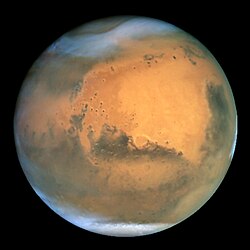
Back استعمار المريخ Arabic Marsın kolonizasiyası Azerbaijani Marsa kuoluonėzavėms BAT-SMG Колонизация на Марс Bulgarian মঙ্গল গ্রহে বসতি স্থাপন Bengali/Bangla Kolonizacija Marsa BS Colonització de Mart Catalan Kolonizace Marsu Czech Colonization of Mars English Colonización de Marte Spanish


Der Begriff Marskolonisation bezeichnet eine hypothetische, dauerhafte Ansiedlung von Menschen auf dem Planeten Mars. Derzeit befassen sich verschiedene Studien und Projekte mit den Problemen des bemannten Marsflugs und der Energie-, Roh- und Baustoffgewinnung[1] sowie der Versorgung mit Wasser[2][3] und mit Nahrung auf dem Mars.[4] Unklar ist, unter welchen Voraussetzungen Menschen dauerhaft in der Marsumgebung überleben bzw. funktions- und arbeitsfähig bleiben könnten.[5][6][7][8] Insbesondere ist ungeklärt, ob Menschen sich auf dem Mars erfolgreich fortpflanzen könnten.[9][10]
- ↑ Loura Hall: Overview: In-Situ Resource Utilization. 1. April 2020, abgerufen am 26. Februar 2021.
- ↑ J. Kleinhenz, J. Collins, M. Barmatz, Gerald E. Voecks, Stephen J. Hoffmann: ISRU Technology Development for Extraction of Water from the Mars Surface. NASA - National Aeronautics and Space Administration, 12. Juni 2018, abgerufen am 26. Februar 2021 (englisch).
- ↑ JSC-Rocknest: A large-scale Mojave Mars Simulant (MMS) based soil simulant for in-situ resource utilization water-extraction studies. In: Icarus. Band 351, 15. November 2020, ISSN 0019-1035, S. 113936, doi:10.1016/j.icarus.2020.113936.
- ↑ Molly Anderson: Introduction to Food Production Challenges in Space. In: NASA Johnson Space Center Houston. NASA, 25. Oktober 2017, abgerufen am 26. Februar 2021 (englisch).
- ↑ Carlo Aleci: From international ophthalmology to space ophthalmology: the threats to vision on the way to Moon and Mars colonization. In: International Ophthalmology. Band 40, Nr. 3, 1. März 2020, ISSN 1573-2630, S. 775–786, doi:10.1007/s10792-019-01212-7.
- ↑ Robert W. Moses, Dennis Bushnell, David R. Komar, Sang Choi, Ronald Litchford: Maintaining Human Health for Humans-Mars. In: 2018 AIAA SPACE and Astronautics Forum and Exposition. American Institute of Aeronautics and Astronautics, Reston, Virginia 2018, ISBN 978-1-62410-575-3, doi:10.2514/6.2018-5360.
- ↑ Charles R. Doarn, J. D. Polk, Marc Shepanek: Health challenges including behavioral problems in long-duration spaceflight. In: Neurology India. Band 67, Supplement, Mai 2019, ISSN 1998-4022, S. S190–S195, doi:10.4103/0028-3886.259116, PMID 31134909.
- ↑ Gilles R. Clément, Richard D. Boyle, Kerry A. George, Gregory A. Nelson, Millard F. Reschke: Challenges to the central nervous system during human spaceflight missions to Mars. In: Journal of Neurophysiology. Band 123, Nr. 5, 15. April 2020, ISSN 0022-3077, S. 2037–2063, doi:10.1152/jn.00476.2019.
- ↑ Konrad Szocik, Rafael Elias Marques, Steven Abood, Aleksandra Kędzior, Kateryna Lysenko-Ryba: Biological and social challenges of human reproduction in a long-term Mars base. In: Futures. Band 100, 1. Juni 2018, ISSN 0016-3287, S. 56–62, doi:10.1016/j.futures.2018.04.006.
- ↑ @NatGeoDeutschland: Kinderkriegen auf dem Mars: Ein unlösbares Problem? 11. Dezember 2018, abgerufen am 26. Februar 2021.